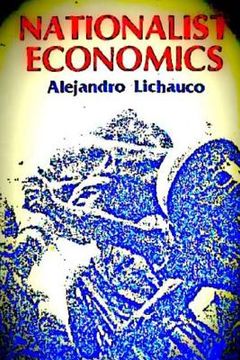Reseña del libro "Nationalist Economics (en Inglés)"
PREFACE The nation is undergoing a socioeconomic crisis whose intensity and complexity are without precedent, and this book has been written for those who wish to understand the origin and nature of that crisis in layman's terms and who are seeking for ways and means out of that crisis, also in layman's terms. The understanding of that crisis need not and should not be confined to economists, and the fundamentals underlying it should be placed within the grasp of every Filipino, even of those who have not had the benefit of a formal course in economics. Just as politics is too important to be left to politicians, interest in the nation's economic situation, and the formulation of the appropriate solutions, should not be confined to economists because the crisis affects the life and well-being of everyone. It is a crisis which in fact threatens the very survival of the Philippines as a nation-state. Too oflen our crisis is perceived by the layman as a moral one because it has been generally explained primarily in terms of a corrupt government, a corrupt bureaucracy, of corrupt cronies and corrupt presidential relatives. But if this were so, if the crisis is fundamentally a function of corruption, how explain that in countries where corruption is equally rampant, considerable economic progress has been made, and continues to be experienced? America's period of accelerated growth and economic take-off coincided with the rise and rule of her robber barons, while the accomplishments of Marxist states have been brought about by overcentralized bureaucracies plagued by the cronyism and corruption which such bureaucracies bring in their wake. The robber barons of America did not prevent her from becoming the most affluent state in the world, and the corruption of her bureaucracy has not prevented the Soviet Union from becoming a formidable industrial and military power. The bureaucracies and political systems of virtually all nations in Asia have long been notorious for their pervasive and intractable venality, but virtually every state in Asia today is on the move, at least in economic terms, posting historic achievements that are conspicuously altering for the better the material condition of peoples. While the Philippines decays. Not long from now, social historians will be explaining why a country flaunted as uthe only Christian nation in Asia" is the most impoverished in the region. The Philippine case is making Christianity, at least in Asia, synonymous with backwardness and poverty. The truth, however, is that the Philippine crisis represents a derangement, not so much of the moral order, as of developmental policy. This book suggests why. Its central theme is that the failure of policy, from which the crisis essentially stems, is due to the fact that policy has ignored the country's vital requirements as a nation-state, and even collides with those requirements. Philippine development policy has been tailored to meet the strategic needs of external interests which profit from the country's situation as a social organism saddled with an economy that belongs to a distant, pre-industrial age. They are forces which profit from the Philippine status quo. To the extent that this fatal misorientation of policy is a result of ignorance on the part of Filipino functionaries responsible for the country's policy, it reflects what nationalist historian Constantino has described as the "miseducation of the Filipino." To the extent that it is a function of conscious error, then it reflects something more sinister and deadlier than corrup- tion. But whatever it is of which we speak, the truth, in its entirety and as one perceives it, must be told. For in that lies freedom. ALEJANDRO LICHAUCO November 21, 1988 Quezon City

